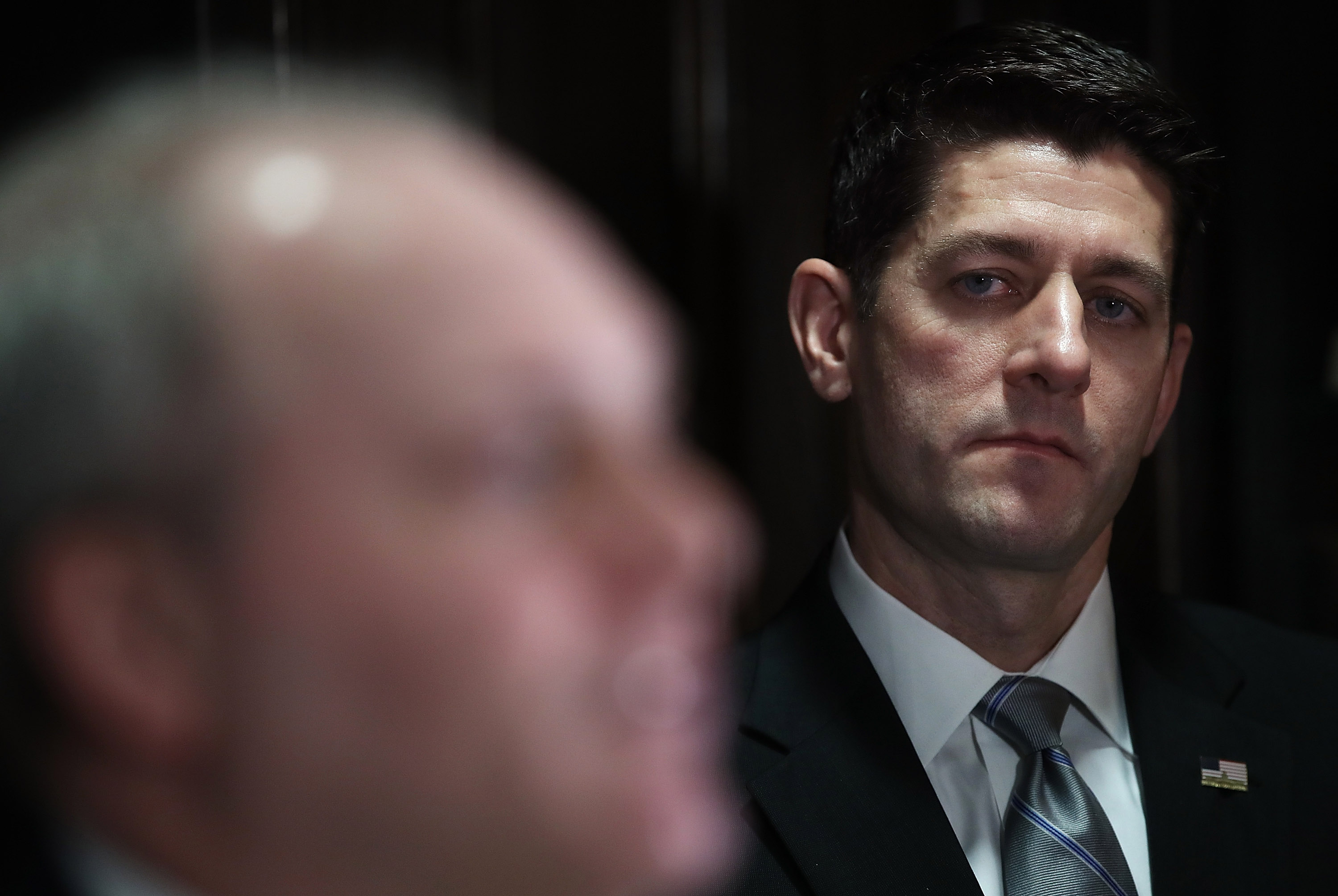How Republicans' ObamaCare repeal will die
Paul Ryan's plan is already in big, big trouble


Republicans in the House unveiled their long-awaited plan to repeal and replace the Affordable Care Act on Monday, and the reception it got was so overwhelmingly negative that it has to represent some kind of milestone in American politics. With a mere seven years to prepare for this moment, Paul Ryan and the rest of the GOP leadership came up with something that's both a policy nightmare and a political catastrophe. And now we can see how the repeal effort will die.
Not that its death is assured, mind you. Republicans still control both houses of Congress and the White House; if they can stay unified, they can pass almost anything they want. But the reaction to this bill shows that unity on this issue will be awfully hard to come by.
Republicans have always faced a dilemma when it comes to repealing the ACA. On one hand, they've long promised their base that they'd slay the terrible beast as soon as they were able; they held 60 or so votes to repeal it when they knew that Barack Obama would veto them. They convinced their base that the law was the most despicable affront to human freedom since Stalin's gulag, and once it was dead, a new day of liberty would dawn. That base then invested ObamaCare with tremendous symbolic importance and came to understand the party's failure to kill it as evidence of their feckless weakness, a spirit that helped lead to the rise of Donald Trump. Now that Republicans actually have the power, they can't fail to do what they promised.
The Week
Escape your echo chamber. Get the facts behind the news, plus analysis from multiple perspectives.

Sign up for The Week's Free Newsletters
From our morning news briefing to a weekly Good News Newsletter, get the best of The Week delivered directly to your inbox.
From our morning news briefing to a weekly Good News Newsletter, get the best of The Week delivered directly to your inbox.
But on the other hand, it turns out that the public likes most of what the ACA does. Not only that, those vaunted white working class voters the GOP so lionizes are particularly reliant on the law's expansion of Medicaid and insurance subsidies. Now throw in the fact that the things Republicans want to do on health care will inevitably result in more uninsured and higher out-of-pocket costs, and repealing it seems increasingly dangerous.
So just look what happened when Ryan released the plan. It was no surprise that Democrats and liberals would condemn it, and they did. Less expected were the attacks from the right. Americans for Prosperity, the Koch brothers' political vehicle, came out against it, as did the free-market Club for Growth and the enforcers of right-wing orthodoxy at Heritage Action. Members of the Freedom Caucus, the House's collection of ultra-right congressmen, were quick to declare it vile, in large part because it gives some tax credits for people to buy coverage (though much less generous than the subsidies of the ACA) and because it doesn't dismantle Medicaid quickly enough. If we presume that Democrats will be united in their opposition, losing a couple of dozen House members would be enough to kill the bill.
But over in the Senate, Republicans have an even more acute problem. A few Tea Party senators have taken the same position as the Freedom Caucus, that the bill doesn't go far enough, while other Republicans are concerned it's too harsh. In particular, those from states that accepted the ACA's expansion of Medicaid are worried about the political impact of throwing thousands of their constituents off their health coverage, which will make for a whole lot of negative news stories and angry voters. And if only three Senate Republicans defect, the bill is dead.
Hovering in the back of all their minds is the 2018 midterm elections. They have good reason to be nervous, because the party that controls the White House almost always loses seats in midterms, and that's particularly true when the president is unpopular, as Donald Trump is now and probably still will be in a year and a half. The other key thing to understand about midterms is that they're all about turnout; the question is which party's voters are more angry and motivated to get to the polls.
A free daily email with the biggest news stories of the day – and the best features from TheWeek.com
The trouble for Republicans with this piece of legislation is that no matter how it turns out, it hurts them in 2018. If it passes, the ensuing suffering and chaos in the health insurance market will make Democratic voters upset and drive them to higher turnout. And if it fails, Republican voters will be disappointed and disgusted with their leaders, and thus more likely to stay home.
There's one more piece of this puzzle to account for: President Trump. He may not understand any of the details of reform, but he knows political heat when he feels it. It wouldn't be at all surprising if, as this bill gets more and more criticized, he edges toward abandoning it. That heat will only increase when the Congressional Budget Office releases its "score" of the bill, showing how much it will cost, how premiums will be affected, and how many will lose coverage. Republicans want to rush the bill out of committee before they get a CBO score (a highly unusual move), which shows just how nervous they are.
It's possible that Paul Ryan has some impossibly clever, multi-stage plan that he has now begun to execute, wherein the first iteration of repeal and replace gets pilloried and then he withdraws it and unveils an even better plan all Republicans welcome with open arms. But if that's what Republicans are waiting for, they'll probably be disappointed.
Paul Waldman is a senior writer with The American Prospect magazine and a blogger for The Washington Post. His writing has appeared in dozens of newspapers, magazines, and web sites, and he is the author or co-author of four books on media and politics.
-
 How climate change is affecting Christmas
How climate change is affecting ChristmasThe Explainer There may be a slim chance of future white Christmases
-
 The MAGA civil war takes center stage at the Turning Point USA conference
The MAGA civil war takes center stage at the Turning Point USA conferenceIN THE SPOTLIGHT ‘Americafest 2025’ was a who’s who of right-wing heavyweights eager to settle scores and lay claim to the future of MAGA
-
 The 8 best drama movies of 2025
The 8 best drama movies of 2025the week recommends Nuclear war, dictatorship and the summer of 2020 highlight the most important and memorable films of 2025
-
 Has Zohran Mamdani shown the Democrats how to win again?
Has Zohran Mamdani shown the Democrats how to win again?Today’s Big Question New York City mayoral election touted as victory for left-wing populists but moderate centrist wins elsewhere present more complex path for Democratic Party
-
 Millions turn out for anti-Trump ‘No Kings’ rallies
Millions turn out for anti-Trump ‘No Kings’ ralliesSpeed Read An estimated 7 million people participated, 2 million more than at the first ‘No Kings’ protest in June
-
 Ghislaine Maxwell: angling for a Trump pardon
Ghislaine Maxwell: angling for a Trump pardonTalking Point Convicted sex trafficker's testimony could shed new light on president's links to Jeffrey Epstein
-
 The last words and final moments of 40 presidents
The last words and final moments of 40 presidentsThe Explainer Some are eloquent quotes worthy of the holders of the highest office in the nation, and others... aren't
-
 The JFK files: the truth at last?
The JFK files: the truth at last?In The Spotlight More than 64,000 previously classified documents relating the 1963 assassination of John F. Kennedy have been released by the Trump administration
-
 'Seriously, not literally': how should the world take Donald Trump?
'Seriously, not literally': how should the world take Donald Trump?Today's big question White House rhetoric and reality look likely to become increasingly blurred
-
 Will Trump's 'madman' strategy pay off?
Will Trump's 'madman' strategy pay off?Today's Big Question Incoming US president likes to seem unpredictable but, this time round, world leaders could be wise to his playbook
-
 Democrats vs. Republicans: who are US billionaires backing?
Democrats vs. Republicans: who are US billionaires backing?The Explainer Younger tech titans join 'boys' club throwing money and support' behind President Trump, while older plutocrats quietly rebuke new administration
